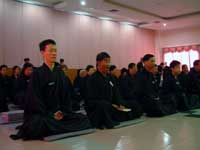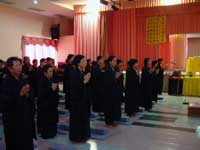|
It was a bright and sunny
morning on the 4th day of the 2nd Chinese Lunar Month of the year
of the Rooster. Than Hsiang Temple in Penang was bursting with activities.
Tens of devotees arrived and gathered in small groups. Greetings
of Amituofo (Amitabha) were passed between fellow friends and devotees.
Some make their way to the canteen for a quick vegetarian breakfast.
Others went upstairs to wait for the monthly “Eight-Precept Cultivation”
to start. Within a short span of time the huge hall was already
packed with 168 devotees, all patiently waiting mindfully for the
start of the day’s programme.
The Eight-Precept Cultivation started at 7:30 a.m. with the explanations
on the schedules and specific instructions. At 8:00 a.m. the observance
of the Eight Precepts started with the singing of an opening hymns
and the taking of the Eight Precepts.
Buddhism is a way of life taught by the Buddha. The precepts are
the curriculum of Buddhist teaching, which are embraced in the moral
code of Buddhism. By observing precepts, not only do we cultivate
our moral strength, but we also perform the highest service to other
fellow beings. We Lay Buddhist observe the Five Precepts daily.
These are the basic precepts that we should practice and abide by.
As a result, we will enjoy the blessings and happiness. On special
days where the opportunities arise we have the chance to observe
Eight Precepts. Today is one such day thanks to the Than Hsiang
Temple initiating these retreats once a month.
The Five Precepts are:
1. Abstaining from destroying living creatures. (bu sha sheng)
2. Abstaining from taking that, which is not given. (bu tou dao)
3. Abstaining from sexual misconduct. (bu yin)
4. Abstaining from incorrect speech. (bu wang yu)
5. Abstaining from intoxicating drinks and drugs which dulls my
mind. (bu yin jiu)
In the Observance of the Eight Precepts the first five precepts
are the same, and the additional three are:-
6. Abstaining from putting garlands, perfumes and cosmetics. (li
hua xiang ying luo xiang you tu shen)
7. Abstaining from using a high or luxurious seat or bed as well
as indulging in songs, dances, music and shows. (li gao sheng chuang
shang zuo ji zuo chang zhi le gu wang guan ting)
8. Abstaining from taking meal after midday. (bu fei shi shi)
Now what are the big differences between the daily Five Precepts
and the Eight Precepts except for the three extra refrains? The
eight precepts may be difficult for a lay Buddhist to follow while
leading a routine working day, especially in a modern society. Those
who make the attempt to observe the eight precepts are those who
wish to experience the disciplined life of renunciation and apart
from avoiding the bad actions one can take positive attitude in
performing the good actions and thoughts. Thus for only one day,
once a month it is good to participate and experience disciplined
cultivation by observing the eight precepts.
The precepts are to help us cut off our attachments, and when that
is done,
then all the precepts are kept naturally. (Dharma Master Wu Bong.)
The schedule for the Eight-Precept Cultivation ranges from the transmission
of eight precepts, general knowledge on Buddhism, evening Service,
Dharma lecture, and Transference of Merits. The great thing about
Than Hsiang as I observe is that although not encouraged, devotees
that cannot come for the whole day may also come in for part of
the day. This is a provision for the connivance of the devotees
to attend the chanting, but these devotees do not observe the eight
precepts.
In observing the last precept, for example, we eat one or two simple
meals between dawn and noon and avoid taking solid food beyond that.
This helps control the craving for food by fasting, cuts down the
time spent on meals and allows us more time to spend on mediation.
It is also good for the body to occasionally fast. As for the sixth
precept, we refrains from enjoying songs, dances, music and shows
during this period of observance so that we will not be distracted
by sensual pleasures that may give rise to unwholesome thoughts.
At the same time, by refraining from the use of ornaments, perfumes
and cosmetics, we become more aware that physical beauty is impermanent
and that we should not be vain. By observing the seventh precept,
we experience a simple way of life with the minimum of luxuries.
These eight training precepts or rules are observed during periods
of intensive meditation and cultivation practice. Observing the
sixth, seventh and eighth precepts requires more effort on us, the
lay Buddhist’s part because we have to restrain ourselves from indulging
in the physical comforts and pleasures that he may be so accustomed
to in everyday life. The purpose is to enable us to detach ourselves
from all the distractions of normal activity in order to gain a
better understanding of the real nature of life. Ven. Wei Wu, abbot
of Than Hsiang advice us that “although we attend the Eight-Precept
Cultivation at Than Hsiang Temple for a part of the day from 7:30
a.m. in the morning until 9:00 p.m. at night, we should continue
to be mindful and continue to observe all the eight precepts for
the rest of the day till 8:00 a.m. the following morning”.
To conclude allow me to quote Dharma Master Wu Bong again. He said,
”If you sit in silence, you are no better than rocks, but all speech
is wrong. What can you do?” Do something positive! one possible
answer is to join the next Than Hsiang “Observance of the Eight
Precepts Day” on the 10th of April 2005 and experience first hand,
the disciplined life through Buddhist meditation and cultivation.
In the process give the highest service to other fellow beings by
the transferring of merits acquired at the end of the day.
|
|
The
Buddha said :
Atta hi attano natho atta hi attano gati
You are your own master, you make your own future .
from the Dhammapada, Verse 380
Not to do any evil,
To cultivate good,
To purify one's mind,
This is the teaching of the Buddhas.
from the Dhammapada, Verse 183
One who destroys life,
speaks false words, takes what is not given,
goes with another man’s wife,
and takes intoxicating drinks and drugs;
such a man
digs up his own roots, even in this very world.
from the Dhammapada: Verses 246-247
|


